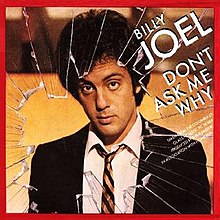Don't Ask Me Why (Billy Joel song)
| "Don't Ask Me Why" | ||||
|---|---|---|---|---|
 | ||||
| Single by Billy Joel | ||||
| from the album Glass Houses | ||||
| B-side | "C'était Toi (You Were the One)" | |||
| Released | July 24, 1980 | |||
| Genre | ||||
| Length | 2:59 | |||
| Label | Columbia Records | |||
| Songwriter(s) | Billy Joel | |||
| Producer(s) | Phil Ramone | |||
| Billy Joel singles chronology | ||||
| ||||
"Don't Ask Me Why" is a 1980 song by Billy Joel released as the third single from the album Glass Houses. The song spent two weeks at number one on the Adult Contemporary chart and peaked at number 19 on the Billboard Hot 100.[6]
The track contains all acoustic and Latin percussion instruments performing in an Afro-Cuban rhythmic style. An eclectic, instrumental "Latin Ballroom" piano solo, played over the bridge section after the second verse, is also featured in part of the song; Joel states that the mix for the midsection includes "fifteen pianos overdubbed on top of each other."[7]
Reception
Billboard found the song to be "catchy" and felt that Joel's vocal performance sounded similar to Paul McCartney.[8] Cash Box said it has a "crisp pop/Latin/rock rhythm" and that the lyrics deal with the "themes of success and chance."[5] Record World called it "one of [Joel's] easy rollin' romantic piano ballads that often become pop standards."[9]
Charts
Weekly charts
| Chart (1980) | Peak position |
|---|---|
| Canada RPM Top Singles[10] | 4 |
| Canada RPM Adult Contemporary[11] | 1 |
| Dutch Singles Chart | 42 |
| French Singles Chart[12] | 42 |
| US Billboard Hot 100[13] | 19 |
| US Billboard Adult Contemporary[14] | 1 |
| US Cash Box Top 100 | 21 |
Year-end charts
| Chart (1980) | Rank |
|---|---|
| Canada[15] | 45 |
| US (Joel Whitburn's Pop Annual)[16] | 122 |
Personnel
- Billy Joel – lead and backing vocals, acoustic piano, Yamaha electric grand piano
- David Brown – acoustic guitar
- Russell Javors – acoustic guitar
- Doug Stegmeyer – bass
- Liberty DeVitto – maracas, bass drum, triangle, claves, ratchet, castanets
See also
References
- ^ "OFF THE RECORD: 'Glass Houses'". The Northwest Florida Daily News.
- ^ "Don't Ask Me Why - Billy Joel | Song Info". AllMusic. Retrieved January 20, 2022.
- ^ "Don't Ask Me Why - Billy Joel". Onefinalserenade.com. Retrieved January 20, 2022.
- ^ "The Stranger at 70: Billy Joel's 25 best songs". Yardbarker.com. March 31, 2020. Retrieved January 20, 2022.
- ^ a b "CashBox Singles Reviews" (PDF). Cash Box. August 2, 1980. p. 18. Retrieved January 1, 2022.
- ^ Whitburn, Joel (2002). Top Adult Contemporary: 1961-2001. Record Research. p. 127.
- ^ Bordowitz, Hank (2006). Billy Joel: The Life & Times of an Angry Young Man. New York: Billboard Books. p. 128. ISBN 978-0-8230-8248-3. Retrieved July 26, 2016.
- ^ "Top Single Picks" (PDF). Billboard. August 2, 1980. p. 60. Retrieved July 8, 2020.
- ^ "Hits of the World" (PDF). Record World. August 2, 1980. p. 1. Retrieved February 20, 2023.
- ^ "RPM 100 Singles (Vol. 34, No. 2, October 25, 1980)". Collectionscanada.gc.ca. Archived from the original on August 17, 2016. Retrieved July 26, 2016.
- ^ "Image : RPM Weekly". Bac-lac.gc.ca. September 27, 1980. Retrieved January 20, 2022.
- ^ "InfoDisc : Bilan des Ventes par Artiste". Infodisc.fr. Retrieved October 16, 2016.
- ^ "Billy Joel Chart History (Hot 100)". Billboard. Retrieved 11 January 2024.
- ^ "Billy Joel Chart History (Adult Contemporary)". Billboard. Retrieved 11 January 2024.
- ^ "Top 100 Singles". RPM. Vol. 34, no. 6. December 20, 1980. Archived from the original on April 25, 2016. Retrieved February 8, 2017.
- ^ Whitburn, Joel (1999). Pop Annual. Menomonee Falls, Wisconsin: Record Research Inc. ISBN 0-89820-142-X.
